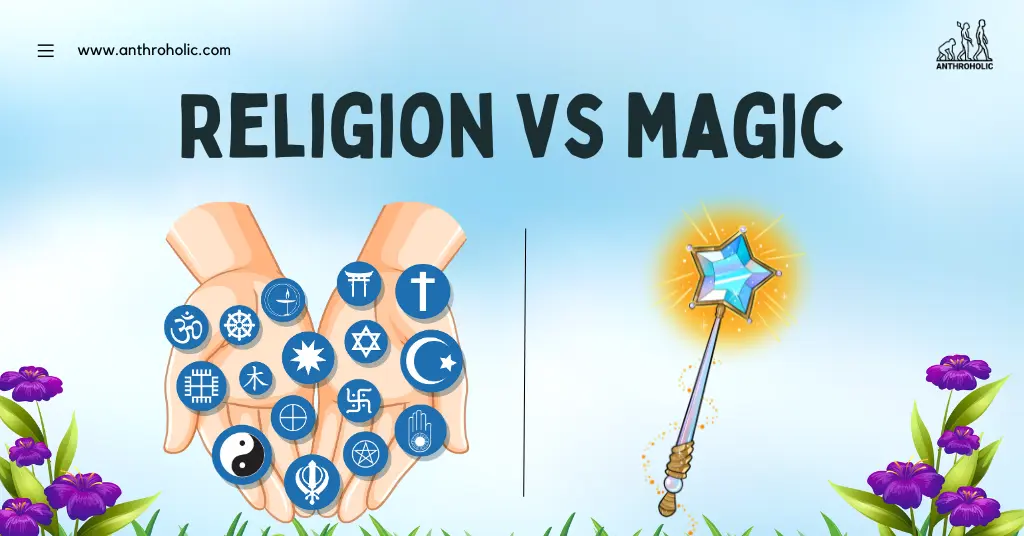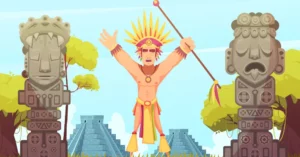AI Answer Evaluation Platform Live Now. Try Free Answer Evaluation Now
Religion vs Magic
The study of religion and magic occupies a crucial space in anthropology. Both have influenced societies, cultures, and individuals in unique and complex ways. However, the delineation between religion and magic isn’t always clear-cut.

Similarities between Religion and Magic
The parallels between religion and magic are rooted in their fundamental nature. They both provide explanations for the unknown, promote social cohesion, and are integral to cultural systems.
- Interpreting the Unknown: Religion and magic serve to demystify phenomena that cannot be explained by human logic or scientific understanding. They offer a framework to make sense of the universe and our place in it [1].
- Promoting Social Cohesion: Both religion and magic can unite communities, creating shared beliefs and rituals. This helps to establish a collective identity and a sense of belonging [2].
- Cultural Integration: Both are intertwined with the fabric of culture, affecting its rituals, ethics, arts, and even governance. They contribute significantly to the diversity and richness of human cultures [3].
Differences between Religion and Magic
While the similarities bind religion and magic, their distinctions are profound. Key differences lie in their societal function, the nature of their practice, and their relations with the supernatural.
Societal Function
| Religion | Magic | |
|---|---|---|
| Purpose | Primarily aims at fostering moral standards and communal harmony [4]. | Primarily used as a tool to manipulate or control certain aspects of reality for individual or immediate purposes [5]. |
| Status | More institutionalized, with organized practices and hierarchies. | Less formalized and more individualistic in nature. |
Nature of Practice
Religion focuses on faith and worship while magic is more centered on action and results.
- Religion: Faith in divine entities and adherence to rituals and doctrines are essential aspects of religious practice. The focus is not merely on immediate results but on moral virtue, divine connection, and spiritual growth.
- Magic: Magic typically involves spells, incantations, or rituals performed with an expectation of specific outcomes. It’s often considered as a means to an end, providing direct control over supernatural forces to achieve desired results.
Relations with Supernatural
- Religion: Interactions with the supernatural in religion are based on reverence, prayer, and worship. There is a distinct division between the human and the divine, with the divine often being superior.
- Magic: Magic attempts to harness and control supernatural forces. The practitioner is perceived to have the power to compel or negotiate with these forces rather than worship them.
Conclusion
Religion and magic, two potent forces in human society, present fascinating similarities and differences. While they both interpret the unknown, foster social cohesion, and are ingrained in culture, they differ fundamentally in societal function, the nature of practice, and relations with the supernatural.
The continuous anthropological exploration of religion and magic highlights the depth and diversity of human understanding and experience. While some societies have clear demarcations between the two, others blur the boundaries, making the study of religion and magic an ongoing and enriching field of inquiry.
References
[1] Tylor, E.B. (1871). Primitive Culture: Researches into the Development of Mythology, Philosophy, Religion, Art, and Custom. https://archive.org/details/primitiveculture01tylouoft/page/n7/mode/2up
[2] Durkheim, E. (1912). The Elementary Forms of the Religious Life.
[3] Evans-Pritchard, E.E. (1937). Witchcraft, Oracles and Magic among the Azande.
[4] Geertz, C. (1973). The Interpretation of Cultures: Selected Essays.
[5] Frazer, J.G. (1890). The Golden Bough: A Study in Magic and Religion.




